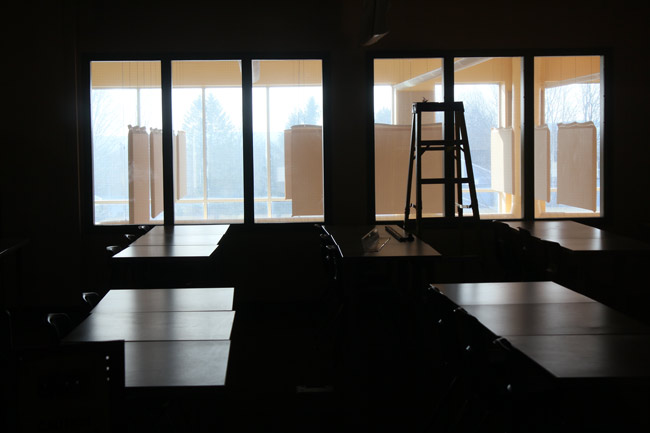
Burned by a recent experience with a charter school that failed, the Flagler County School Board on Tuesday not only blocked—for now—the application of a new charter school in Flagler County, but used the occasion to send a strict message to all charter school applicants in the future.
“We need to make a statement to people coming into Flagler County with charter schools,” School Board member Andy Dance said, “and that is, if they don’t come with local support and local board members already in hand, if they can’t come to the table and show us that they’ve got residents that are willing to step up and volunteer and put the time and effort into a charter school to make it successful, then they don’t need to apply.”
That was the case with an organization calling itself Flagler Charter Academy of Excellence—actually, a front for the Leona Group, a Phoenix-based for-profit corporation that runs some 60 charter schools in Arizona, Ohio, Michigan and Florida. It is among the largest charter school concerns in the nation.
It was also the last of four charter school applicants in Flagler County this year. The other three dropped out, possibly to return next year. Flagler Charter wants to run a combined middle and high school in what would be a 22-classsroom building it has not yet secured, with up to 550 students. Its focus would be students for whom English is not necessarily a first language, as well as students with learning disabilities, or gifted students—two groups of students who don’t generally get the attention of charter schools, but who are nevertheless attractive to some organizations because of their lucrative potential: the state funds special education students at higher rates than other students.
There is currently no high school charter in Flagler County. Heritage Academy was the last such, but the school board closed it last year, after Heritage recorded two successive years as a failing school. There remain three elementary and middle school charters—Imagine School at Town Center, which has generally had a good, problem-free relationship with the school board and maintained good overall ratings, and Palm Harbor Academy, which got a failing grade this year for the first time. Global Outreach Charter Academy opened this fall on the grounds of the county airport, with a focus on students who want to learn a second language, especially Russian.
Charter schools are, in fact, public schools: they’re funded with public, tax dollars. But they are privately run. Some are for-profit, some are non-profit. All three existing charter schools in Flagler County are non-profit. (Imagine got its designation in August. The designation applies to 29 schools in the Imagine group, retroactive to the group’s founding in 2005.) The charter schools must have a governing board of their own. But it’s the district school board that provides ultimate oversight, reviewing a charter’s application, approving or rejecting it, and, when a charter is approved, ensuring that the school remains in compliance, financially, educationally and organizationally. Charter schools develop close allegiances with their parent communities.
But when things go wrong, it’s not the charter’s own boards that take the flack. The district school board does, making charters paradoxically immune from the political fallout of failure. That’s why local district school boards are increasingly weary of charters, even as the Florida Legislature has made the expansion of charter schools a priority—to the point of cutting off construction funding to traditional schools, and diverting that funding to charter schools (though a charter must be in operation at least three years to qualify for construction dollars).
Heritage parents and that school’s staff bitterly criticized the Flagler school board when it closed Heritage. So board members are particularly careful now when approving new applications. Tuesday evening, board member Colleen Conklin led the charge against the Leona Group’s application, seeking to deny it outright for several reasons. She did not like the fact that the Leona Group’s application was incomplete (it fulfilled 15 of 19 criteria). She did not like the group’s track record elsewhere. And she did not like the absence of a locally chosen governing board.
“The original intention of the carter school movement was when local students’ needs were not being met and teachers and parents who were frustrated by that came together to propose an educational program to meet the needs of those students,” Conklin said. “It was home-grown. It wasn’t from a corporation that comes in and sees an issue. We’re looking at an application, regardless of how we like it, once you start digging in there, there is a trend here in the background of this company.”
Conklin did not succeed in having the application rejected, but merely tabled for two weeks. In the interim, the company will have to produce a list of responses to board concerns. The board voted 3-2 to table the matter, with Conklin and Dance in dissent. They would have rejected the application, and let the Leona Group appeal the decision, if it so wishes, to the state. Board chairman Sue Dickinson hesitated for several, long seconds before casting her tie-breaking vote. She was clearly conflicted. But in the end she agreed to give the company two more weeks.
Stewart Maxcy, who’s in charge of reviewing the district’s charter applications with his team, acknowledged that the company had its issues when asked about it by board member John Fischer.: “Like any charter school, there are areas of pros, and areas of cons, depending on where you’re at, what state or what area of the state they’re in,” Maxcy said. “I don’t know that it’s always the Leona Group management or if it’s the school-based management that’s the issue. It depends on what you read.”
Conklin was frustrated by the absence of a state-based system that would provide background checks on the applicants, who, she said, can write whatever they please in the application. “Anybody can put anything down on a piece of paper,” she said. “We all, this board, learned some, I would hope, very valuable lessons, going through the process that we went through and having to actually shut a school down, and I wouldn’t want those lessons to be lost. I don’t think that the Leona Group has a very good reputation.”
She described the Leona Group as the third-largest for-profit school management company in the country, but being privately held company, its books are closed to public scrutiny—though its school-level financial statements will have to be one to scrutiny, being public records. “I don’t want to see us in the situation where we have a school of dedicated teachers, parents who fall in love with the school, but a management company that does the wrong thing,” Conklin aid.
She cited a Broward County case involving the Leona Group, that was reported by ProPublica in 2011: “Paragon Academy of Technology and Sunshine Elementary Charter School fired the Leona Group, a Phoenix-based management company, in August 2009 when Leona unilaterally dismissed the school’s principal and made other management decisions without seeking board approval, according to legal filings,” ProPublica reported.
“The Leona Group promptly sued in Florida state court in Broward County, arguing that the schools had wrongly terminated the agreement and that the company had loaned the schools $180,000 to keep them afloat. Michael R. Atkins, the management company’s general counsel, said Leona is seeking to recoup those funds and wants a resolution that allows the schools to continue to operate. The schools counter-sued, arguing that Leona “failed or refused” to produce a range of documents, including staff and teacher contracts, and bank account statements. Leona ignored requests to return their property, including “the master key for the school facilities and all electronic and hard-copy school records and documentation,” according to the schools’ complaint.
“Two board members of Leona-managed schools in Florida told ProPublica that they had trouble finding out how Leona was spending their money from the time the company took over the schools in May 2008.”
Conklin also quoted from articles citing poor performance by the Leona Group in Michigan, and elsewhere, including lacking student achievement and the absence of local board members sitting on Leona’s school-based governing boards (which are required for every charter school, as part of the oversight). She was also uncomfortable with the budget the company had filed, which doesn’t show what its management fee would be.
“We’ve been down some of these roads, and I don’t want to see us go down some of these roads again,” Conklin said. “The comfort level for me is absolutely not there.”
Chuck Malatesta, a Leona Group regional director in Florida, was at the meeting and tried to calm some of the board members’ concerns. The Broward situation was before his time, he said, describing it as an issue where the Leona Group took over for another management company. Once the audit was in, the company found out that the previous management company had misapplied funds. Leona Group “gifted” half a million dollars to the schools to repair the damage. But the second year, a disagreement with the charter’s board led to a breakdown in the relationship.
Maxcy said the school board will have a chance to make specific demands in its charter contract with the Leona Group, which the company can then either accept or reject.
That may not be enough for some board members.
“To me it just boils down to local involvement,” Dance said. “The lesson I believe learned from our past problems was with strong board members that were properly qualified and had local interests, and the local students in mind. I know as we talked you said maybe there’s a way you can write into the contract where we require local representation and a certain percentage on the board. But if we go forward with that, I believe we are going in it already with our hands tied.”































out of curiosity says
Thank you Mrs. Conklin!!!
Liana G says
There is a research paper published not too long ago showing that students at charter high schools don’t do as well as students at traditional public high schools. Of course, one should not place too much stock into this research since public schools have developed a notorious reputation for manipulating grades and for transitioning out students who will bring down their graduation rates.
Still, corruption and cheating stem from opportunity and greed; and not paying attention presents plenty of both. My kids have a new interim principal who hails from a charter high school. The previous principal of 10 years was asked to resign/retire immediately following the results of an investigation into cheating and other unethical practices. (I wonder if term limits would work. Something along the lines of having employees transferred to different schools every 5 years.)
That aside, many of the kids – mine included, willingly forgo lunch to help out in the Program’s Office, and to participate in discussion groups sponsored by the very engaging and friendly librarians at their school. And they’re never without a book to read – a nice plus. Spending free time in their school library makes them not want to leave without a book to read, they say. Orwell’s 1984 and Tolstoy’s Anna Karenina are the latest reads.